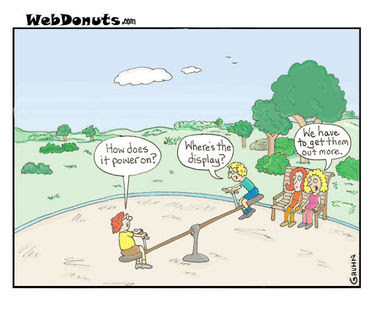Digital Natives: Has technology fundamentally changed how students learn?
As the newest generation goes through school, often teachers will indicate that students are fundamentally different than they once were. They explain that students have been changed by technologies and that they learn differently because they are "digital natives" and always have been. In the article Digital Natives, Digital Immigrants, author Prensky agrees with this idea that "today's students are no longer the people our educational system was designed to teach" (2001, pg. 1). However, the problem with this is two-fold. First, it negates the idea of researched educational learning theories and secondly it ignores that fact that not all students have equal access or exposure to technologies in a productively meaningful way.
 |
| "Outdoors" by Gruhn is licensed by CC BY 2.0 |
How students learn has been widely researched and the idea that students are individuals with unique learning styles and intelligences should not be thrown out the window even as the newest generation comes to school with technology awareness. The theory of constructionism has been around for awhile, but connectivism is increasingly important as a learning theory as students very obviously learn through interaction, collaboration, and interest. With increased educational technologies so must research into learning theories continue so that teachers can best understand how to increase learning with the added value of technologies. And of course it is important to understand that value must be added and tools should never be used as novelties with no purpose.
And while it is true that students today have been living in a world where technologies have always been available, it isn't true that technologies have always been made available to them. And beyond the equality of availability is equity of usage and experience. Students need to learn how to use and manipulate technologies for creation purposes rather than as consumers alone. Teachers will always be needed as a means to deliver and facilitate high-quality instruction for students to build their 21st-century skills.
This post is in response to a post by Michael Barbour.
References
Prensky, M. (2001). Digital natives, digital immigrants – Part II: Do they really think differently? On the Horizon, 9(6). Retrieved from http://www.marcprensky.com/writing/Prensky%20-%20Digital%20Natives,%20Digital%20Immigrants%20-%20Part1.pdf
McKenzie, J. (2007). Digital nativism: Digital delusions and digital deprivation. From Now On, 17(2). Retrieved from http://fno.org/nov07/nativism.html

I totally agree with you that technology needs to have a purpose in the classroom. When I integrate it into my lessons I make sure I ask myself how this going to improve the learning experience for my students. Even if my students are familiar with the technology we are using I try to show them how to use it and manipulate it for their benefit.
ReplyDeleteNot to get off track, but as we have become parents, obviously getting older, has every generation claimed, “we didn’t act like that when we were youngins.”?
ReplyDeleteI know I have, and since I brought up generations, can we ask if the “elders” questioned the reason of “change” in our youth was due to medias such as radio, motion pictures, music, and television? My point is, even though being brought up in a digital period, do we have to change the dynamic of education for these other times?
Thank you for your response Frederick. Is your question whether or not media changes the way we should teach?
DeleteBen, thank you for your comment. It is so important to use technology for a purpose! And for students to understand that...even better! I love that you help students use it for their benefit!
ReplyDelete